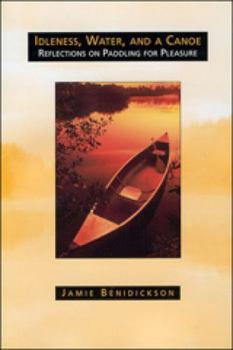Idleness, Water, and a Canoe: Reflections on Paddling for Pleasure
Select Format
Select Condition 
Book Overview
In the spring of 1940, subscribers to Queen's Quarterly read that the 'ingredients of a holiday in Canada are idleness, water, and a canoe.' This statement bears witness to the enduring importance of the canoe generations after the decline of the North American fur trade. Jamie Benidickson explains that the canoe's merit lies not strictly in its function as a transportation vehicle, but in its promise of unrestricted mobility, leisure, and independence. Idleness, Water, and a Canoe is a study of the place of the canoe in Canadian life, with comparative references to the United States and Britain. A blend of history, economic analysis, technical information, and social commentary, it examines the rise of the canoe's popularity and its influence on leisure activity, economics and tourism, and literature and advertising in this country. Drawing on books, newspaper articles, original records, unusual ephemera, and interviews with paddlers, the author describes the evolution and cultural significance of two centuries of recreational paddling. He explores why canoeists have constantly sought new summer waterways, how they have practised their craft, and how much influence paddling for pleasure has had on them and on the societies in which they live. The many facets of recreational paddling are illustrated and described in a series of reflections on subjects ranging from the paddler's quest for physical and emotional renewal to what the future holds for voyageurs and their sport. Benidickson also discusses the evolution of canoe design and manufacturing, the formation of canoe clubs and organizations, the economics of recreational travel, and the paddler's role in environmental protection. Not only will this book appeal to those interested in history, sociology, aesthetics, geography, and sports and leisure studies, but its broad scope and accessible style will recommend it to the many outdoor enthusiasts who plan yearly canoeing trips.
Format:Paperback
Language:English
ISBN:0802079105
ISBN13:9780802079107
Release Date:May 1997
Publisher:University of Toronto Press
Length:300 Pages
Weight:1.15 lbs.
Dimensions:0.9" x 6.0" x 9.0"
Customer Reviews
1 rating
Enjoying canoeing in your arm chair
Published by Thriftbooks.com User , 24 years ago
I enjoyed this book with a wide ranging and detailed account of recreational canoeing mainly in Canada. With over thirty years canoeing experience in various disciplines mainly in the United Kingdom (latterly open canoeing in wilderness areas including a week near Temagami) I appreciated in particular the attempts to describe the special benefits and effects of paddling in remote areas and how some experienced a closeness to God. There was much that was new to me in nearly all areas as the author has brought together the results of extensive research from written and verbal sources. Some aspects such as the Canadian summer boy, the use of the canoe as a popular image and extensive wilderness areas are particular to Canada which has a much greater historic canoe heritage compared to the UK. The author demonstrates that there are many reasons why people are attracted to canoeing. These include a love of landscape, about being closer to god, about doing what our ancestors did , about getting away from it all(whatever it may be) and about finding and healing ourselves which are elaborated on. The book is not a manual nor a guidebook. The author also states, reminiscing about past journeys and anticipating a planned expedition are absorbing off season preoccupations and his book can remind one of their past experiences and contribute to an understanding of what might be expected on a future trip. Though there is attention to detail I found the book an enjoyable and absorbing read.





